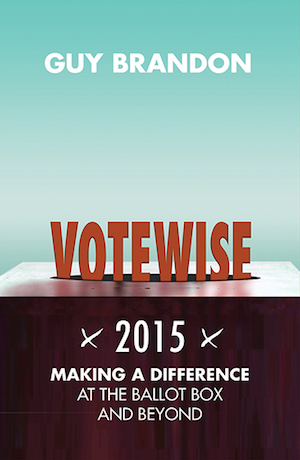 If you’re a Christian thinking about how to vote (or whether to vote) in the 2015 General Election, and if you read just one short book on the topic, then make it this one. I doubt anyone else will publish something more helpful, in terms of being brief and to the point, covering a wide range of issues (rather than just a couple of headline ‘Christian’ issues), and in terms of bridging the gap between the Bible and the political questions facing us today.
If you’re a Christian thinking about how to vote (or whether to vote) in the 2015 General Election, and if you read just one short book on the topic, then make it this one. I doubt anyone else will publish something more helpful, in terms of being brief and to the point, covering a wide range of issues (rather than just a couple of headline ‘Christian’ issues), and in terms of bridging the gap between the Bible and the political questions facing us today.
Votewise 2015 is the third of the Jubilee Centre’s ‘Votewise’ books, with previous editions published prior to the 2005 and 2010 General Elections. Each book has been written afresh, and this time the author is Guy Brandon, part-time researcher for the Jubilee Centre, but with contributions from others at the end.
The book faces the reality that many Christians will be inclined to disengage from politics, whether that’s by doing no more than voting (‘to place a cross on our ballot sheet and to use this as an excuse to disengage from politics for the next five years’, p.13), or by not voting at all. But there are many important issues at stake, and we have a responsibility to use our votes in the best way.
Ten issues are tackled in the book: marriage and family, the economy, debt, welfare, Europe, immigration, the environment, crime, education, and health. Each is tackled in the same way: the issue is presented, then we delve under the surface (e.g., what is the economy for? what is education for? what is health?), then we look to the Bible for insight, and finally there is an attempt to draw out some implications for policy.
One recurring theme is the importance of relationships. (This will be no surprise to anyone familiar with the Jubilee Centre.) In all of the areas covered, there is an enormous relational deficit. But the laws given in the Old Testament were all about maintaining and strengthening relationships: within extended families, within the nation, with the land, and with the surrounding nations. A Christian approach to politics will give attention to the place of relationships, in every area of policy.
The final two chapters form something of an anticlimax, it has to be said. The chapter on relationships seems unnecessary, given the way relationships have featured throughout the book. Then the final chapter (before the conclusion) features contributions from members of each of the five main UK parties. These have no connection with the material in the rest of the book, and say very little at all about the points of contact between the Christian faith and the visions of each party. Instead, they descend into bog-standard party-political broadcasts. Much better would have been either to give the contributors a simple questionnaire, or for Guy Brandon to have written those parts himself. (An idea for next time, perhaps?)
So, leaving those chapters to one side, that’s just 85 pages. What are you waiting for?